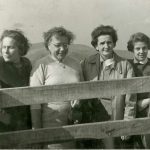 ZARAH: Women’s labour activism in Eastern Europe and transnationally, from the age of empires to the late 20th century (Web)
ZARAH: Women’s labour activism in Eastern Europe and transnationally, from the age of empires to the late 20th century (Web)
In February 2020, the ZARAH project started. ZARAH is an ERC-advanced-grant-project. It explores the history of women’s labour activism and organizing to improve labour conditions and life circumstances of lower and working class women and their communities – moving these women from the margins of labour, gender, and European history to the centre of historical study. Read more … (Web).
In September 2020, the ZARAH weblog „Finding Women in the Sources“ started. So far the following contributions have been published here (Web):
- Susan Zimmermann: Female trade unionists and women workers in state-socialist Hungary
- Alexandra Ghit: Re-reading local sources: Finding gendered trade unionism in a Transylvanian factory newspaper
- Zhanna Popova: The invisible women: Zyrardów strike of 1883
- Ivelina Masheva: Strike bulletins as sources: women workers in the 1931 Tundzha strike in Bulgaria: Strike bulletins as sources: women workers in the 1931 Tundzha strike in Bulgaria
- Veronika Helfert: What do police records reveal? Looking for striking women workers in October 1950, Austria
Description: „The aim of ZARAH is to research women’s labour activism in Eastern Europe in its variety and complexity, and bring women activists that were often placed at the margins of labour, gender, and European history to the centre of historical inquiry. In the course of the study, we encounter precious sources that give a glimpse into the experiences of these women, experiences that were unknown, disregarded, or omitted before. The research agenda of ZARAH also includes making such sources available to the scholarly community and interested public via an online database. In order to showcase research in progress, we would like to share here some illuminating sources that we have encountered so far here, on the website of ZARAH. Sources such as these form the indispensable springboard for the thoughtful analysis of the history of women’s labor activism.“
„Right from the start of her research, an historian investigating women’s labour activism is confronted with a challenge: sources often tend to focus on men rather than women, even when …“. Read more (Web).
